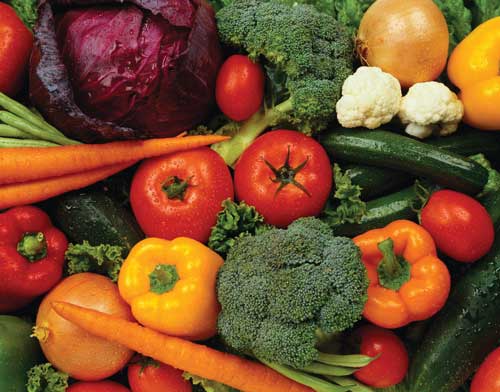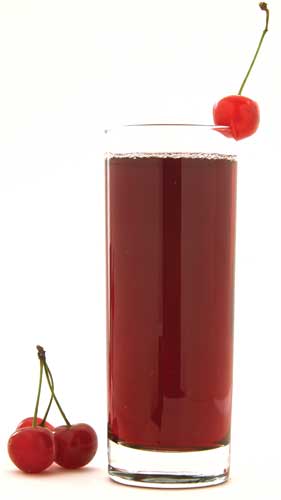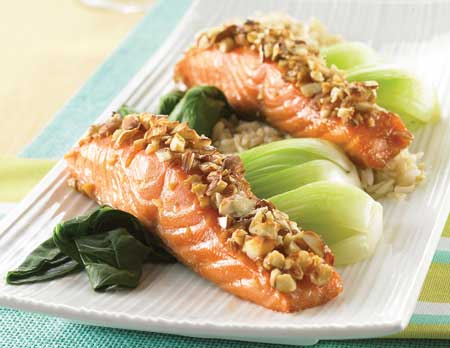Turning Down the Heat: Anti-Inflammatory Ingredients
NUTRACEUTICALS
 Inflammation is the latest buzzword in the healthy food and beverage arena. Acute inflammation is part of the body’s immune system response. What people are focused on today is chronic inflammation. Chronic inflammation is potentially linked to arthritis, heart disease, diabetes, and autoimmune disease.
Inflammation is the latest buzzword in the healthy food and beverage arena. Acute inflammation is part of the body’s immune system response. What people are focused on today is chronic inflammation. Chronic inflammation is potentially linked to arthritis, heart disease, diabetes, and autoimmune disease.
Anti-inflammatory diets stress including as much fresh food as possible, minimal consumption of processed and fast foods, and a variety of fruits and vegetables. Ingredients with anti-inflammatory properties can be found in supplements, beverages, and even bars. Some of these ingredients have an effect on inflammatory markers such as C-reactive protein (CRP) and interleukin-6 (IL-6). Here is a look at some of the nutritional ingredients believed to help combat inflammation, including curcumin, polyphenols, omega-3 fatty acids, and antioxidants.
Curcumin
Curcumin, derived from turmeric, has been attracting interest recently. It contains compounds called curcuminoids that have been shown to have antioxidant and anti-inflammatory effects in the body.
CurcuWIN is a commercial form of curcumin from OmniActive Health Technologies, Morristown, N.J. (omniactives.com). CurcuWIN is a water-soluble curcumin formulation with enhanced absorption, providing highly bioavailable curcuminoids. In a human clinical trial comparing commercial curcumin ingredients, Jäger et al. (2014) demonstrated that CurcuWIN increased relative absorption of total curcuminoids 46 times over standard curcumin. In the same trial, CurcuWIN was shown to be significantly more bioavailable than other enhanced commercial forms of curcumin.
At the 2015 Experimental Biology meeting, Vijaya Juturu, manager of global scientific and clinical affairs with OmniActive Health Technologies, presented two posters on emerging science surrounding curcumin (OmniActive 2015). The first study investigated the effects of curcumin supplementation on changes in serum parameters and antioxidant status of muscle in rats after exhaustive exercise on a motor-driven rodent treadmill. The results suggested that CurcuWIN is a potential ingredient for preventing muscle damage as well as improving exercise performance and increase in time of exhaustion. In addition, a significant decrease in LDL-cholesterol and triglycerides was also observed.
In the second study, the antioxidant effects and safety of curcumin supplementation in rats was monitored for a period of six weeks. CurcuWIN’s antioxidant effects were shown by a significant decrease in muscle oxidative stress markers and significant improvements in antioxidant enzymes in curcumin-treated groups. The researchers observed no treatment-related changes in liver and kidney functions and no histopathological changes, demonstrating the safety of CurcuWIN.
Sabinsa, East Windsor, N.J. (sabinsa.com), in March 2015 launched a nanoparticle-free water soluble curcumin, uC3 CLEAR, providing an improved, more convenient delivery system for curcumin (Sabinsa 2015a). The company also offers Curcumin C3 Complex, which contains a minimum of 95% curcuminoids, and Curcumin C3 Reduct, which solves the problem of staining. Published preclinical and clinical studies have shown that curcuminoids possess anti-arthritic activity, which was attributed to its anti-inflammatory, antioxidant, anti-catabolic, and anti-apoptotic activities.
Most recently, Sabinsa’s Curcumin C3 Complex was shown to help reduce the serum levels of triglycerides, LDL cholesterol, and very low density lipoprotein (VLDL) cholesterol in subjects with coronary artery disease (Sabinsa 2015b). The randomized double-blind placebo-controlled clinical study was conducted at the Tehran Heart Center Hospital in Iran between December 2011 and February 2013. The study tested 33 subjects with coronary artery disease, and it lasted eight weeks. Each subject was given four capsules of 500 mg of Curcumin C3 Complex/day or a placebo in addition to conventional therapies. The results revealed that curcumin supplementation significantly reduced the serum levels of LDL and triglycerides compared to the baseline. This study also showed a significant decrease in the VLDL values in those who took the curcumin.
--- PAGE BREAK ---
 Tart Cherries
Tart Cherries
The anthocyanins in tart cherries have been shown to aid in alleviating inflammation, particularly in the arthritis and gout arenas. According to the Cherry Marketing Institute, Dewitt, Mich.(choosecherries.com), one study found that when healthy women ate two servings (280 g) of cherries after an overnight fast, they showed a 15% reduction in uric acid levels, as well as lowered nitric oxide and C-reactive protein levels, all of which is associated with inflammatory diseases like gout. In another study, researchers at Oregon Health & Science University found that osteoarthritic subjects who drank two 10.5-oz bottles of tart cherry juice/day for 21 days experienced a significant reduction in serum biomarkers of inflammation. They concluded that tart cherry juice may be an effective way for osteoarthritis patients to manage their disease.
Tart cherry juice has also been shown to aid in exercise recovery by helping to reduce inflammation (Cherry Marketing Institute 2012). In one study, runners who drank cherry juice twice a day for seven days prior to and on the day of a long-distance relay had significantly less muscle pain following the race. A similar study in marathoners found that runners who drank cherry juice five days before, the day of, and two days after running a marathon experienced a faster recovery of strength, increased total antioxidant capacity, and reduced inflammation and lipid peroxidation compared to those who drank a non-cherry juice beverage.
Apple Peel
Dried apple peel powder (DAPP) is an organic, whole food ingredient made from dried apple peel. AppleActiv, Quebec (appleactiv.com), the functional food division of Leahy Orchards, offers AppleActiv DAPP, which contains a high level of polyphenol antioxidants. Denis et al. (2013) provided evidence of the capacity of DAPP to reduce oxidative stress and inflammation, two pivotal processes involved in inflammatory bowel diseases. Caco-2/15 cells were used to study the role of DAPP preventive actions against oxidative stress and inflammation induced by iron-ascorbate (Fe/Asc) and lipopolysaccharide (LPS).
Jensen et al. (2014) showed that consumption of DAPP was associated with improved joint function and improved serum antioxidant protection status in a pilot study. The observed pain reduction may have been associated with the improved antioxidant status and linked to the apple polyphenols’ anti-inflammatory effects. The open-label clinical pilot study involved 12 healthy subjects with moderate loss of joint range of motion and associated chronic pain. The subjects consumed 4.25 g of DAPP/day for 12 weeks, with evaluations at baseline, two, four, eight, and 12 weeks. Twelve weeks of consumption of DAPP was associated with improved range of motion and a statistically significant improvement in serum antioxidant protective status. DAPP inhibited both COX-2 and lipoxygenase enzymes, and pretreatment of inflammatory polymorphonuclear cells with DAPP before inflammatory stimulus resulted in reduced reactive oxygen species formation. This suggested multifaceted anti-inflammatory properties of DAPP.
Omega-3 Fatty Acids
Omega-3 fatty acids have been shown to have anti-inflammatory properties. Calder (2015) explained that the omega-3 fatty acids from fish oil, eicosapentaenoic acid (EPA), and docosahexaenoic acid (DHA), are able to partly inhibit a number of aspects of inflammation. Mechanisms underlying their anti-inflammatory actions include altered cell membrane phospholipid fatty acid composition, disruption of lipid rafts, inhibition of activation of a pro-inflammatory transcription factor, and activation of an anti-inflammatory transcription factor.
In a technical paper from DSM, Parsippany, N.J. (dsm.com), Krall and Arnold (2015) cited studies where omega-3 fatty acids in fish oil may have played an anti-inflammatory role in arthritis, multiple sclerosis, and the inflammatory response triggered by exercise.
Omega-3 fatty acids have been shown to benefit heart health in healthy people and to also benefit those at high risk of or who have cardiovascular disease. Research has shown that omega-3 fatty acids can help decrease risk of arrhythmias (abnormal heartbeats), decrease triglyceride levels, slow growth rate of atherosclerotic plaque, and slightly lower blood pressure. Regarding inflammation, high blood levels of CRP have been linked to the inflammation observed in heart disease. Some studies have reported that consumption of omega-3s reduces CRP in people with heart disease.
 Almonds
Almonds
Almonds have been linked to heart health, satiety, and weight management. Berryman et al. (2015) showed that a daily snack of 1.5 oz (42 g) of almonds instead of a high-carbohydrate muffin, eaten as part of an overall healthy diet, improved a number of heart disease risk factors in study participants (Almond Board of California 2015). The participants ate cholesterol-lowering diets that were identical except that one group was given 1.5 oz of whole almonds while the other group was given a banana muffin that provided the same number of calories. Both diets reduced total and LDL cholesterol from baseline, but the reduction was greater in those who ate the almonds compared to those who ate the muffin. In addition, eating 1.5 oz of almonds/day for six weeks improved LDL/HDL ratios from baseline and reduced apolipoprotein B more than eating the control diet. The control diet increased C-reactive protein, a marker of inflammation, while no increase in this marker was observed with the almond diet.
www.ift.org
Members Only: Read more about ingredients that may reduce inflammation online at ift.org. Type the keywords into the search box at the upper right side of the home page.
 Linda Milo Ohr,
Linda Milo Ohr,
Contributing Editor
Denver, Colo.
[email protected]
References
Almond Board of California. 2015. “New Research Shows Snacking on Almonds Instead of a High-carb Snack Reduced Belly Fat and Other Heart Disease Risk Factors.” Press release, Jan. 6. Almond Board of California, Modesto, Calif. almonds.com.
Berryman, C. E., S. G. West, J. A. Fleming, P. L. Bordi, and P. M. Kris-Etherton. 2015. “Effects of Daily Almond Consumption on Cardiometabolic Risk and Abdominal Adiposity in Healthy Adults with Elevated LDL-cholesterol: A Randomized Controlled Trial.” J. Am. Heart Assoc. doi: 10.1161/JAHA.114.000993.
Calder, P. C. 2015. “Marine Omega-3 Fatty Acids and Inflammatory Processes: Effects, Mechanisms and Clinical Relevance.” Biochem. Biophys. Acta. 1851(4): 469–484.
Cherry Marketing Institute. 2012. “The Red Report. The Science behind Tart Cherries.” choosecherries.com.
Denis, M. C., A. Furtos, S. Dudonne, A. Montoudis, C. Garofalo, Y. Desjardins, E. Delvin, and E. Levy. 2013. “Apple Peel Polyphenols and Their Beneficial Actions on Oxidative Stress and Inflammation.” PLoS ONE. 8(1): e53725. doi:10.1371/journal.pone.0053725.
Jäger, R., R. P. Lowery, A. V. Calvanese, J. M. Joy, M. Purpura, and J. M. Wilson. 2014. “Comparative Absorption of Curcumin Formulations.” Nutr. J. 13:11.
Jensen, G. S., V. L. Attridge, K. F. Benson, J. L. Beaman, S. G. Carter, and D. Ager. 2014. “Consumption of Dried Apple Peel Powder Increases Joint Function and Range of Motion.” J. Med. Food. 17(11): 1204–1213.
Krall, K., and C. Arnold. 2015. “Fighting Inflammation with Fortification.” Technical paper, February. Fortitech Premixes by DSM and DSM Nutritional Products, Schenectady, N.Y. fortitechpremixes.com.
OmniActive. 2015. “OmniActive Presents Posters on the Effects and Safety of Highly Soluble Curcumin (CurcuWIN) at Experimental Biology Meeting.” Press release, April 3. OmniActive Health Technologies, Morristown, N.J. omniactives.com.
Sabinsa. 2015a. “Sabinsa Launches New, Nano-free Water Soluble Curcumin Form: uC3 CLEAR.” Press release, March 18. Sabinsa, East Windsor, N.J. sabinsa.com.
Sabinsa. 2015b. “Sabinsa’s Curcumin C3 Complex Shows Significant Benefits in Lipid Levels in Patients with Coronary Artery Disease.” Press release, May 19.


